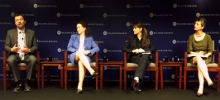
On March 19, the Atlantic Council’s Iran Task Force held a public briefing on the dynamics of Iran’s internal politics on March 19. This briefing also marked the release of the Task Force’s sixth issue brief, “Iran’s Internal Politics: The Supreme Leader Grows Ever Lonelier at the Top” by Yasmin Alem and Barbara Slavin.
With tensions running high between Iran and the West, Iranians went to the polls March 2 for the first time since the contested elections of 2009. Opponents of President Mahmoud Ahmadinejad won an overwhelming majority of parliamentary seats, but the credibility of the results were undermined as opposition leaders including prominent reformists boycotted the elections. Panelists explored the implications of the voting for Iranian domestic and foreign policy. Will the apparent consolidation of power by Supreme Leader Ali Khamenei allow him to be more flexible in negotiating over the nuclear issue?
The Iran Task Force, co-chaired by Atlantic Council Chairman Senator Chuck Hagel and Ambassador Stuart E. Eizenstat, seeks to perform a comprehensive analysis of Iran’s internal political landscape, its role in the region and globally, and any basis for an improved relationship with the West. Please click here for more information about the Iran Task Force.
Introductory remarks by
Stuart E. Eizenstat
Board Member and Co-Chair, Iran Task Force
Atlantic Council
A discussion with
Yasmin Alem
Indpendent Scholar and Author, Duality by Design: The Iranian Electoral System
Suzanne Maloney
Senior Fellow, Foreign Policy, Saban Center for Middle East Policy
Brookings Institution
Alireza Nader
Senior International Policy Analyst
RAND Corporation
Moderated by
Barbara Slavin
Senior Fellow, South Asia Center
Atlantic Council
The Iran Task Force is generously supported by the Ploughshares Fund.

